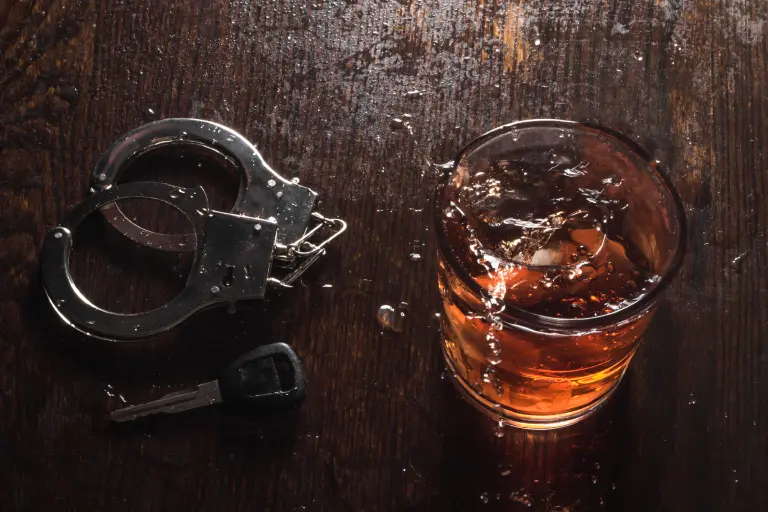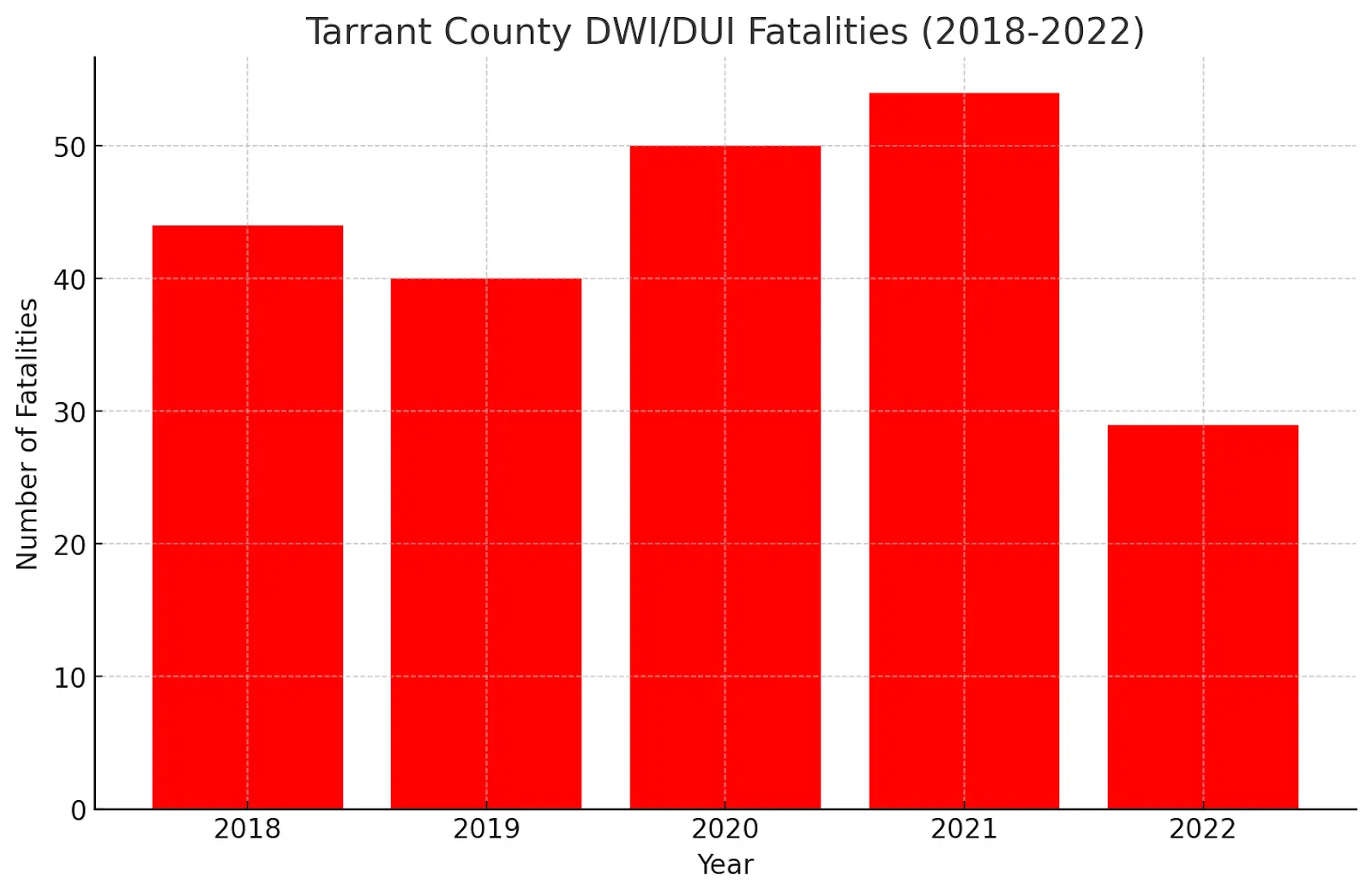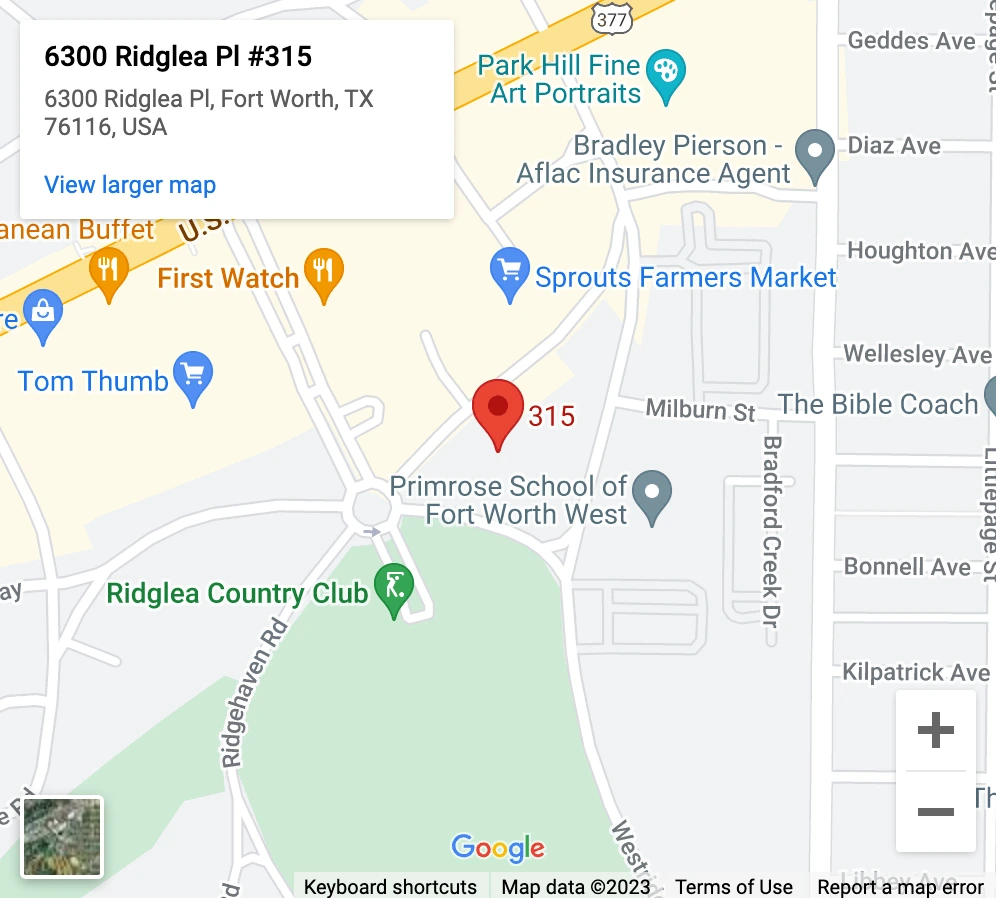
Were you recently arrested for a DWI in Fort Worth, TX? Facing DWI charges can be life-altering, with the threat of losing your license, paying hefty fines, and even jail time. Remember, an arrest doesn’t have to lead to a conviction. Call our Fort Worth criminal defense office at 817-477-4100 for a free case evaluation. At Cole Paschall Law, we understand the gravity of your situation and we are here to offer you the strongest defense strategy to challenge these charges.
With a combined experience of over 50 years, our legal team has a profound understanding of the complexities involved in DWI cases in Tarrant County. Our expertise isn’t just limited to DWI cases – we handle a range of criminal defense areas, including domestic violence, theft charges, drug crimes, assault and battery, sex crimes, serious felonies, and more. Our in-depth knowledge and local courtroom experience equip us to uniquely defend your rights effectively.
A DWI charge in Fort Worth doesn’t have to define your future. Schedule a free consultation with our Fort Worth office today to explore your legal options and craft a strategy tailored to your situation.
How Can Cole Paschall Law Help if You Were Arrested for a DWI in Fort Worth?

In Fort Worth, DWI cases are a serious matter, rigorously prosecuted by authorities well-versed in DWI laws. Facing such charges requires an equally formidable defense, and that’s where Cole Paschall Law steps in. Our legal team is not just experienced but also deeply knowledgeable about Texas DWI laws, ensuring you have the robust representation you need.
At Cole Paschall Law, we bring more than 50 years of collective legal experience to the table. Our attorneys are not just skilled practitioners; they are also recognized for their expertise in criminal law with a 10.0 Avvo ranking and Shawn Pascall’s board certification. Our deep local legal experience, combined with a broad understanding of DWI specifics, positions us uniquely to handle your case.
When you engage Cole Paschall Law for your DWI defense, here’s what you can expect from our team:
- Thorough Investigation: We conduct a detailed investigation into your DWI arrest, scrutinizing every aspect from the traffic stop to the evidence collection.
- DMV Hearings Representation: We act swiftly to request a DMV hearing, aiming to prevent or delay the suspension of your driver’s license.
- Evidence Analysis: Our team meticulously examines the prosecution’s evidence, identifying weaknesses and inaccuracies that can be pivotal to your case.
- Evidence Gathering for Your Defense: We collect and compile evidence that supports your innocence, from surveillance footage to witness statements.
- Expert Consultations: Where necessary, we bring in forensic experts, medical professionals, and other specialists to provide testimony and insights that bolster your defense.
- Negotiation with Prosecutors: With a strategic approach, we negotiate with prosecutors, aiming to have the charges reduced or, where possible, the case dismissed.
Our primary objective at Cole Paschall Law is to achieve the best possible outcome for your case. Whether it’s fighting for a dismissal, negotiating for reduced charges, or representing you in court, we are committed to providing you with the skilled legal defense you deserve. Don’t take our word for it see what our reviews have to say.
If you or a loved one is facing DWI charges in Fort Worth, don’t hesitate to reach out to us. At Cole Paschall Law, your initial consultation is free, offering you a risk-free opportunity to understand your legal options and how we can assist you. Call us today at 817-477-4100 for expert legal advice and dedicated defense.
Fort Worth DWI Statistics

Fort Worth, a key city in Tarrant County, Texas, has its own unique challenges when it comes to DWI (Driving While Intoxicated) offenses.
Understanding the local statistics on DWI cases is crucial for anyone facing such charges or looking to understand the scope of the issue in the region.
- Trends and Numbers: In recent years, Fort Worth has seen varying trends in DWI cases. The number of arrests and convictions can fluctuate, influenced by factors such as law enforcement initiatives and public awareness campaigns.
- Arrest Rates: Analyzing arrest rates provides insight into the frequency of DWI incidents and the effectiveness of law enforcement in identifying and apprehending offenders.
- Conviction Rates: Conviction rates in Tarrant County offer a glimpse into the legal system’s response to DWI offenses, including factors like prosecution effectiveness and defense strategies.
- Impact of DWI Cases: Beyond the numbers, DWI cases have a profound impact on individuals and the community, from personal repercussions for the accused to broader public safety concerns.
| Tarrant County DWI/DUI statistics | 2022 | 2021 | 2020 | 2019 | 2018 |
| Crashes | 1,474 | 1,610 | 1,391 | 1,544 | 1,519 |
| Fatalities | 29 | 54 | 50 | 40 | 44 |
| Minor Injuries | 351 | 358 | 235 | 266 | 287 |
| Serious Injuries | 115 | 147 | 91 | 74 | 104 |
These statistics not only reflect the current state of DWI offenses in Fort Worth but also help in understanding the effectiveness of measures taken to combat intoxicated driving. For individuals facing DWI charges, this information can provide context and prepare them for what lies ahead in their legal journey.
Tarrant County DWI Fatalities Current Decline

Tarrant County is down 46% in DWI fatalities from January 1, 2021, to February 1, 2022. This reflects a notable decrease in the number of deaths caused by DWI/DUI incidents during this time frame.
DWI Fatalities in Tarrant County
Driving While Intoxicated (DWI) is a common abbreviation. It’s a violation of state laws committed by someone who operates a motor vehicle while intoxicated.
In Tarrant County, there were 46 DWI fatalities in 2020. In the following year, over 2,000 Drunk driving fatalities were reported in Texas.
An accident doesn’t need to happen to affect your life. If the police charge you with a Fort Worth DWI, you could find yourself taking on the justice system. You will need an experienced Fort Worth DWI Lawyer who knows the judges and programs within your county.
Sometimes, the consequences for DWIs can be harsh. To avoid receiving the worst penalties, you should work with a Fort Worth DWI Lawyer. Cole Paschall Law knows the difficulties that come with defending DWIs. Our firm can take on your case and fight for a positive outcome.
Overview of the DWI Laws in Texas
In Texas, as in all states, driving while intoxicated (DWI) by drugs or alcohol is a serious criminal offense. Texas law defines DWI offenses and their consequences under the Texas Penal Code and the Texas Transportation Code. Understanding these laws is essential for anyone navigating DWI-related legal challenges.
The Legal Definition of DWI in Texas:
In Texas, DWI laws are primarily outlined under Section 49.04 of the Texas Penal Code. The law makes it illegal to:
- Drive While Intoxicated: Operating a motor vehicle in a public place while intoxicated is prohibited. Intoxication is defined as not having the normal use of mental or physical faculties due to the consumption of alcohol, a controlled substance, a drug, a dangerous drug, a combination of two or more of those substances, or any other substance in the body.
- Driving with a Prohibited Blood Alcohol Content (BAC): In Texas, it’s illegal to drive with a BAC of 0.08% or higher. This is often referred to as “per se DWI.”
Key Aspects of Texas DWI Laws:
- BAC Levels: For drivers 21 years and older, a BAC of 0.08% or higher is illegal. For commercial drivers, the limit is 0.04%. Texas enforces a “zero-tolerance” law for drivers under the age of 21, meaning any detectable amount of alcohol is illegal.
- DWI with Drugs (DUID): Similar to alcohol, driving under the influence of drugs (prescription, over-the-counter, or illegal) is also illegal and carries similar punishments.
- Implied Consent Law: Texas law stipulates that if you drive on Texas roads, you have implicitly consented to chemical testing (breathalyzer or blood test) for alcohol or drugs. Refusal can lead to automatic license suspension and other penalties.
- Penalties: DWI penalties in Texas can vary depending on factors like BAC level, number of offenses, and whether a minor was present in the vehicle. They can range from fines, jail time, license suspension, to mandatory education programs.
Aggravating Factors and Felony DWI:
While most DWI offenses are misdemeanors, certain circumstances can elevate them to felony charges. These include:
- Multiple Offenses: Repeat DWI offenders can face more severe penalties, including longer jail time and higher fines.
- DWI with a Child Passenger: Driving while intoxicated with a passenger under 15 years old is a state jail felony in Texas under, Texas Code of Criminal Procedure section 49.045.
- Intoxication Assault and Manslaughter: If a DWI incident results in serious injury or death, the charges can be elevated to intoxication assault or manslaughter, both of which are felonies according to section 49.08 of Texas law.
Navigating DWI laws in Texas can be complex, especially given the severity of the charges and the potential impact on one’s life. Understanding these laws is the first step in preparing a solid defense strategy or making informed decisions about handling a DWI case. If you’re facing DWI charges in Texas, it’s crucial to consult with an experienced DWI attorney who can guide you through the legal process and advocate on your behalf.
What’s the Difference Between a DUI & DWI?

Understanding the distinction between DUI (Driving Under the Influence) and DWI (Driving While Intoxicated) is crucial, especially if you find yourself navigating the complexities of traffic laws in Texas. While these terms are often used interchangeably, they carry specific legal definitions and implications.
- DWI Explained: In Texas, DWI refers to operating a motor vehicle in a public place while lacking the normal use of mental or physical faculties by reason of the introduction of alcohol, a controlled substance, a drug, a dangerous drug, or a combination thereof into the body; or having an alcohol concentration of 0.08 or more.
- DUI Defined: DUI typically applies to drivers under the age of 21 who are operating a vehicle with any detectable amount of alcohol in their system. This falls under Texas’s zero-tolerance policy for underage drinking and driving.
Navigating the nuances between a DWI and a DUI can be complex. If you or someone you know is facing such charges in Fort Worth, seeking advice from a knowledgeable DWI lawyer is crucial. An experienced attorney can provide guidance tailored to your specific situation, helping to protect your rights and navigate the legal system effectively. For expert legal assistance, contact Cole Paschall Law at 817-477-4100.
What is the DWI Legal Process?
Navigating the legal landscape of a DWI case in Fort Worth can be complex and intimidating. Understanding each step of the process, from arrest to potential trial, is crucial for anyone facing DWI charges. Here’s a detailed breakdown of what you can expect:
Arrest to Trial
From the moment of your DWI arrest, a series of legal procedures begin to unfold. This journey includes everything from the initial police stop to potential court trials.
- Initial Stop and Arrest: Understanding the circumstances under which a DWI arrest can legally be made in Fort Worth.
- Assessment and Evidence Collection: Insight into how evidence, such as breathalyzer and field sobriety test results, is collected and used.
Booking and Bail
After arrest, the booking process involves formal documentation, and bail can be a crucial factor in regaining your freedom before trial.
- The Booking Process: What to expect during booking, including fingerprinting and recording personal information.
- Securing Bail: Strategies for securing bail effectively, including understanding bail amounts and conditions.
Court Appearances
Navigating through various court appearances is a critical part of the DWI process, each with its unique purpose and implications.
- Arraignment: Your first court appearance and what it entails.
- Pre-Trial Conferences: The role and importance of these meetings in the broader context of your DWI case.
- Trial Preparation: How to prepare if your case goes to trial.
Plea Bargains
Plea bargains can play a significant role in the resolution of DWI cases, offering an alternative to going to trial.
- Negotiating Plea Bargains: Understanding the negotiation process and what it means for your case.
- Benefits and Risks: Evaluating the benefits and potential downsides of accepting a plea bargain.
Trial Process
If your case goes to trial, being prepared for what to expect can significantly impact the outcome.
- Jury Selection: The process of selecting a jury and its importance in a DWI trial.
- Presenting Evidence: How evidence is presented and contested during a DWI trial.
- Verdict and Sentencing: Understanding the potential outcomes of a DWI trial.
This detailed overview of the DWI legal process in Fort Worth is designed to demystify the experience and prepare you for each stage of the journey. Remember, having knowledgeable legal representation can make a significant difference in navigating these complexities.
What are Common DWI Mistakes to Avoid?
When faced with a DWI charge in Fort Worth, it’s easy to feel overwhelmed and make mistakes that could adversely affect your case. Being aware of common pitfalls and how to avoid them is crucial. Here’s a guide to some typical errors and misconceptions:
During Arrest
The way you handle yourself at the time of your arrest can significantly impact your case.
- Self-Incrimination: Understand your right to remain silent to avoid self-incrimination.
- Compliance and Conduct: Importance of remaining polite and compliant, while not divulging more information than necessary.
Interactions with Law Enforcement
Your interactions with law enforcement during a DWI stop are critical.
- Communication: How to communicate effectively without compromising your legal position.
- Field Sobriety Tests: Understanding your rights regarding field sobriety tests and how to handle them.
Misconceptions
Dispelling common myths can help you navigate your DWI case more effectively.
- Legal Myths: Addressing misconceptions about DWI laws in Texas, such as the idea that a DWI is unavoidable if you fail a breathalyzer test.
- Rights and Regulations: Clarifying misunderstandings about your rights during a DWI stop and subsequent legal processes.
Avoiding these common mistakes can help protect your rights and improve the chances of a favorable outcome in your DWI case. Remember, consulting with a knowledgeable DWI lawyer in Fort Worth can provide you with the guidance and support needed to navigate this challenging situation effectively.
What Are the Penalties for a DWI in Fort Worth, Texas?
Being charged with a DWI (Driving While Intoxicated) in Fort Worth, Texas, can lead to serious legal consequences, as established by Texas law. The penalties for a DWI conviction in Texas vary based on factors like the severity of the offense, the driver’s blood alcohol concentration (BAC), and any prior DWI convictions. Understanding these penalties is crucial for anyone facing a DWI charge in Fort Worth.
First DWI Offense:
- Fines: Up to $2,000.
- Jail Time: From 3 to 180 days in county jail.
- License Suspension: Your driver’s license can be suspended for up to 2 years.
- Annual Surcharge: For 3 years, you may have to pay an annual surcharge of up to $2,000 to keep your driver’s license.
- DWI Education Program: Mandatory attendance in a DWI education class.
- Community Service: Possible 24 to 100 hours of community service.
Second DWI Offense:
- Fines: Up to $4,000.
- Jail Time: 30 days to 1 year in county jail.
- License Suspension: Possible suspension of your driver’s license for up to 2 years.
- Annual Surcharge: Annual fee of up to $2,000 for 3 years to retain your driver’s license.
- DWI Intervention Program: Mandatory attendance in a DWI intervention program.
- Community Service: 80 to 200 hours of community service.
Third DWI Offense:
- Fines: Up to $10,000.
- Jail Time: 2 to 10 years in the Texas Department of Criminal Justice.
- License Suspension: Suspension of your driver’s license for up to 2 years.
- Annual Surcharge: Annual fee to retain your driver’s license.
- Community Service: 160 to 600 hours of community service.
Additional Penalties:
- DWI with a Child Passenger: If you’re charged with a DWI while a passenger under 15 years old is in the vehicle, it’s considered a state jail felony, punishable by fines up to $10,000 and jail time from 180 days to 2 years.
- Ignition Interlock Device: In some cases, you might be required to install an ignition interlock device in your vehicle.
- Permanent Record: A DWI conviction will go on your permanent criminal record, which can impact employment opportunities, insurance rates, and more.
Aggravating Factors:
Certain factors can enhance the penalties of a DWI in Fort Worth. These include having an extremely high BAC, causing an accident, or having previous DWI convictions.
Facing DWI charges in Fort Worth can be a life-altering event, with significant penalties that can impact your future. It’s crucial to take these charges seriously and consider seeking legal advice from a knowledgeable DWI lawyer who can guide you through the legal process and help mitigate these potential penalties.
Alternative Options for DWI
DWI charges in Fort Worth don’t always lead to the stereotypical outcomes of heavy fines or jail time. There are alternative options and paths within the legal system that can lead to more favorable results, especially for first-time offenders or those with mitigating circumstances.
Diversion Programs
Diversion programs offer a chance for rehabilitation instead of traditional sentencing, particularly for first-time offenders.
- Eligibility and Process: Criteria for entering diversion programs and what they entail.
- Benefits: How these programs can lead to reduced charges or even dismissal of charges upon successful completion.
Probation
Probation is another alternative to incarceration, allowing individuals to remain in their community under supervision.
- Terms of Probation: Understanding the conditions and requirements of probation in DWI cases.
- Violation Consequences: The repercussions of failing to adhere to probation terms.
Deferred Adjudication
Deferred adjudication can lead to the dismissal of charges after fulfilling certain conditions.
- Understanding Deferred Adjudication: What it is and how it differs from standard guilty pleas.
- Long-Term Implications: Impact on criminal record and future implications.
Impact on Employment and Driver’s License
A DWI conviction can have far-reaching effects beyond the legal realm, affecting your professional life and driving privileges.
- Employment Challenges: Potential hurdles in maintaining or securing employment post-conviction.
- License Suspension or Revocation: Understanding the process and how to potentially mitigate these outcomes.
These alternative options highlight the importance of having a knowledgeable Fort Worth DWI lawyer who can navigate the legal system and advocate for such alternatives where applicable. The right legal strategy can significantly alter the course and outcome of a DWI case.
Changes in Texas DWI Laws
The landscape of DWI laws in Texas, including Fort Worth, is not static. Changes and amendments can have significant implications for those facing DWI charges. Staying informed about these changes is crucial for an effective defense strategy.
- Recent Legal Amendments: Overview of the latest changes in Texas DWI laws, including any adjustments in penalties, procedural aspects, or enforcement policies. Such as Texas House Bill 3582, which altered punishments on some DWI cases in September of 2019.
- Impact on DWI Cases: Analysis of how recent legal changes might affect DWI cases, defense strategies, and potential outcomes for those charged.
- Staying Informed: The importance of working with a Fort Worth DWI lawyer who is up-to-date with the latest legal developments and how this knowledge can benefit your case.
Understanding these changes ensures that your defense strategy aligns with the current legal framework, increasing the chances of a favorable resolution in your DWI case. It also underscores the dynamic nature of legal practice in the realm of DWI defense, where ongoing learning and adaptation are key.
Benefits of Early Legal Representation
Securing legal representation immediately after a DWI arrest in Fort Worth is a critical step that can significantly influence the trajectory and outcome of your case. Early involvement of an attorney offers several key advantages:
- Immediate Guidance and Support: From the moment of your arrest, a lawyer can provide crucial legal advice, helping you avoid common mistakes that could negatively impact your case.
- Strategic Planning: Early involvement allows for more time to develop a comprehensive and effective defense strategy. Your lawyer can start gathering evidence, interviewing witnesses, and examining the prosecution’s case right away.
- Negotiation Leverage: Early representation can be beneficial in plea bargain negotiations. Lawyers who intervene early often have more leverage to negotiate favorable terms.
- Mitigating Damage: An attorney can take steps to mitigate the impact of the charges on your life, such as working to reduce bail amounts or arguing for less restrictive pre-trial conditions.
The benefits of early legal representation in a DWI case cannot be overstated. It provides you with immediate access to legal expertise and proactive defense, greatly enhancing your chances of a positive outcome. Remember, in legal matters, especially in DWI cases, time is a crucial factor.
What Defenses Can Be Raised if I’m Arrested in DWI Charges in Texas?
If you’re arrested on DWI charges in Texas, it’s crucial to understand that there are several defense strategies that can be employed to challenge the allegations. While each case is unique and dependent on its specific circumstances, some common defenses have proven effective in Texas DWI cases.
1. Questioning the Legality of the Traffic Stop:
- Unlawful Stop: One of the primary defenses is challenging the legality of the initial traffic stop. If the stop was made without probable cause, any evidence gathered during the stop could be deemed inadmissible.
2. Challenging Field Sobriety and Breathalyzer Tests:
- Inaccuracy of Field Sobriety Tests: The reliability of field sobriety tests can be questioned, as they can be influenced by factors like physical conditions, nervousness, or even the environment where they were conducted.
- Breathalyzer Calibration and Operation: The accuracy of breathalyzer tests can be contested, especially if there were issues with the device’s calibration or if it was improperly operated. Under the Texas Department of Public Safety there a procedures and guidelines that must be followed to operate a breathalyzer to maintain accuracy.
3. Medical Conditions and Other Influences:
- Medical Issues: Certain medical conditions or medications can affect breathalyzer results or mimic signs of intoxication.
- Dietary Factors: In some cases, dietary factors can lead to false positives on breathalyzer tests.
4. Rising Blood Alcohol Concentration:
- Timing of BAC Testing: The defense can argue that your BAC was below the legal limit while driving but rose to illegal levels by the time the test was administered.
5. Procedural and Rights Violations:
- Miranda Rights Violation: If you weren’t read your Miranda rights at the time of the arrest, certain statements or evidence might be excluded.
- Improper Police Procedures: Law enforcement must follow arrest laws during any arrest. Any procedural errors made by law enforcement during the arrest or evidence collection can be grounds for defense.
6. Lack of Evidence or Contradictory Evidence:
- Insufficient Proof: The defense can argue that the prosecution lacks sufficient evidence to prove intoxication beyond a reasonable doubt.
- Witness Testimonies: Witnesses, including passengers, can sometimes provide contradictory evidence to the prosecution’s claims.
7. Expert Testimony:
- Forensic Experts: In some cases, forensic experts can be brought in to challenge the evidence presented by the prosecution, such as the results of chemical tests.
It’s important to remember that a successful defense strategy in a DWI case often requires an in-depth legal understanding and the ability to effectively argue in court. This underscores the value of having a skilled DWI attorney in Texas who can evaluate the specifics of your case, identify the most viable defenses, and advocate on your behalf to protect your rights and seek the best possible outcome.
FAQ About DWI Cases
Facing a DWI charge can be overwhelming, and you likely have many questions about what to expect and how to proceed. Below are some commonly asked questions about DWI cases in Fort Worth, along with informative answers to guide you through this challenging time.
- What are the DWI penalties in Texas? Understand the range of penalties you might face, from fines to jail time, based on the specifics of your case.
- How do field sobriety tests work? Gain insights into different types of field sobriety tests used by law enforcement and their implications.
- What is considered a legal BAC limit in Texas? Know the blood alcohol concentration (BAC) limits that define legal intoxication in Texas.
- Can a DWI conviction be expunged? Explore the possibilities and conditions under which a DWI conviction might be removed from your record.
- What are ignition interlock devices and when are they required? Learn about these devices, their purpose, and scenarios where they might be mandated by the court.
- How much does it cost to hire a DWI attorney? Get an idea of the legal fees associated with hiring a DWI attorney and understand the factors that influence these costs.
- How can a DWI affect my insurance rates? Understand the potential impact of a DWI on your auto insurance rates.
- Why is hiring a DWI attorney important? Discover the benefits and importance of having experienced legal representation in a DWI case.
These FAQs are designed to provide you with a basic understanding of DWI cases in Fort Worth. However, every case is unique, and for specific advice tailored to your situation, it’s best to consult directly with a qualified DWI lawyer.
Case Studies
At Cole Paschall Law, we believe that real-life examples can be incredibly instructive. To illustrate how we handle DWI cases and the results we’ve achieved, let’s delve into some case studies that showcase our approach and the outcomes we’ve secured for our clients in Fort Worth.
Case Study 1: Challenging the Evidence
- Background: A client faced serious DWI charges with potential jail time due to a high BAC reading.
- Approach: Our attorneys meticulously reviewed the case, focusing on the calibration and operation of the breathalyzer used.
- Outcome: We successfully argued that the breathalyzer results were unreliable, leading to a significant reduction in charges.
Case Study 2: Negotiating a Plea
- Background: A first-time offender with a DWI charge, worried about the impact on their career.
- Approach: Negotiated with the prosecution, highlighting the client’s clean record and proactive steps taken towards rehabilitation.
- Outcome: Secured a plea deal involving probation and community service, avoiding jail time.
Case Study 3: Trial Victory
- Background: A client insisted on their innocence despite failing field sobriety tests.
- Approach: Challenged the validity of the field tests and brought in expert witnesses to testify.
- Outcome: The jury returned a not-guilty verdict, swayed by the strong defense presented.
These case studies demonstrate our commitment to rigorous defense, attention to detail, and our ability to navigate complex legal challenges effectively. They underscore why choosing an experienced Fort Worth DWI lawyer can be the deciding factor in the outcome of your case.
Schedule a Free Consultation With a Fort Worth DWI Lawyer
Navigating a DWI case in Fort Worth can be a challenging and stressful experience. However, armed with the right information and the support of experienced legal counsel, you can effectively manage and overcome these challenges. At Cole Paschall Law, we are committed to providing our clients with the comprehensive legal support and representation they need during these difficult times.
- Our Commitment: We are dedicated to fighting for the rights of our clients and working tirelessly to achieve the best possible outcomes in their DWI cases.
- Expertise and Experience: With over 50 years of combined legal experience, our team has the knowledge and skills to handle a wide range of DWI cases and related criminal defense matters.
- Personalized Approach: We understand that every case is unique. We take the time to understand your situation, offering tailored advice and strategies to meet your specific legal needs.
If you or someone you know is facing DWI charges in Fort Worth, don’t hesitate to reach out to Cole Paschall Law. We’re here to help guide you through the legal process and provide the defense you deserve. Contact us at 817-477-4100 to schedule a free consultation and take the first step towards protecting your rights and your future.
—
For more information on DWI defense and other legal services we offer, please visit our Fort Worth DWI Record Sealing Lawyer page. Explore our site for insights into various other practice areas, including assault, domestic violence, juvenile crimes, and more.
Fort Worth DWI Lawyer Review

Read the review here.
Read more of our Google reviews here.
Our Criminal Defense law firm in Fort Worth also provides:
Drug Crimes Attorney in Fort Worth
Domestic Violence Lawyers in Fort Worth
Family Violence Lawyer in Fort Worth
Misdemeanor Crimes Attorney in Fort Worth






